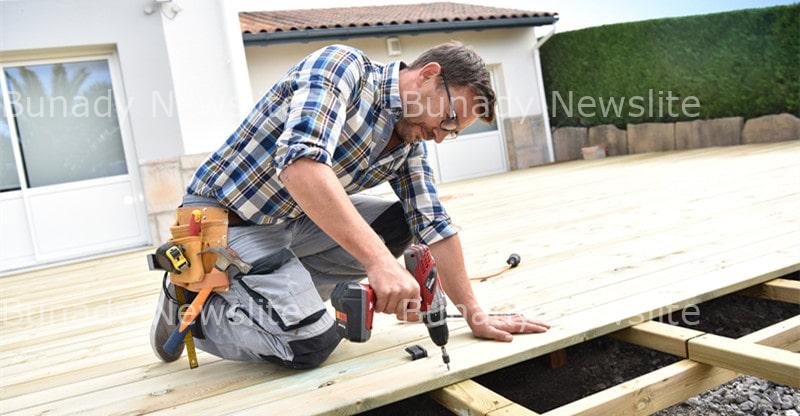Decks are versatile home additions ideal for hosting small gatherings and relaxing with loved ones or alone. A thoughtfully designed deck raises your property’s worth and betters its aesthetics. Constructing a deck that aligns with your home’s overall appeal and lifestyle can be difficult. Nonetheless, implementing the right strategies smoothens the process. Outlined below are seven tips for building a deck.
1. Opt for a custom design... CLICK TO READ THE FULL NEWS HERE▶▶
A custom deck is usually tailored by a contractor to resonate with your specific design preferences and needs. They have a special personal touch style and are designed for your lifestyle. Custom Decks have multiple rewards every homeowner can leverage. The unique elements they bring into your backyard help personalize your deck design to ensure it matches your overall home style.
In addition, a custom deck caters to specific functions and needs, meaning you can get any features added to them.
For instance, if you’re looking to complement your property’s exterior, built-in planters or seating can help. A custom deck will seamlessly align with your surroundings to improve aesthetics and add to your home’s worth. Custom decks offer an edge that you can get from other standard designs.
2. Find the right deck builder or contractor

Building an outstanding deck that can significantly raise your home value and aesthetics requires an experienced deck builder’s expertise. Their knowledge and skills will ascertain that your deck is structurally sound. Professional contractors have exceptional skills and only use the best materials to design your custom/ dream deck.
Considering the many deck builders available today, selecting the best can be daunting. However, looking at the following can help:
Professional credentials: Since a deck is an extension of your house, there are specific safety and building codes it must meet. As such, the builder you pick should be licensed, as this shows that they’re certified and understand deck building and safety codes. Ensure they’re insured to avoid being liable for any injuries or damages that might occur during and after the project’s completion.
Experience and knowledge: Experience demonstrates a deck builder’s ability and work quality, so be sure to check how long they’ve been in business and look at their portfolio to see the projects they’ve successfully handled and the designs they’ve developed for past clients to determine if they can handle your deck building project.
Customer satisfaction backup: To find a reliable deck builder, consider what past customers say about their experiences. When reading recommendations and reviews, focus more on comments that touch on professionalism level, work quality, timeliness, cost-effectiveness, and customer service.
The best deck builder should understand your goals and needs and should be able to communicate clearly and effectively.
3. Select the right decking materials
Selecting the best decking materials is key to building your dream deck. Different decking materials come at varying prices. Luckily, you can find materials that match your budget. To choose a suitable decking material, consider:
How you want your deck to look
The required maintenance
How you intent to use it
Treated pine is an affordable, versatile option that you can paint or stain to attain a desired look. It’s lightweight and easy to work with. Hardwood decking has high strength, is long-lasting, and is naturally beautiful. It should be treated with oil or timber finish regularly to maintain its appeal.
Composite decking is a popular but higher-budget decking option. It’s made from a combination of several materials, which makes it a more sustainable option. Location is another factor that influences your decking material choice due to the weather element.
If you reside in an extremely cold region, go for a decking material that can withstand the freezing temperatures. Since composite materials are well insulated, they can survive in extreme temperatures. Pressure-treated wood is another option that’s meant to resist decay or rot.
For hot climates, your material should be able to handle the heat. You can pick composite materials for this weather because they don’t warp or expand when exposed to the sun.
In high-humidity areas, go for wood, but ensure it’s treated to avoid decay and rot. Composite materials are an excellent option as they don’t absorb moisture, which may result in mold and mildew growth.
4. Get a permit
To build a deck, you require a permit. It’s a legal requirement that every homeowner must meet. However, you should check your local regulations to ensure compliance. Constructing a deck without a permit can get you into serious legal trouble. Building codes relating to deck installation cover considerations like:
How far apart you must place the supporting posts
Structural joists and beam dimensions
Planking thickness
Stairways and railings’ design and height
Approved connectors and fastener types, and more
If you’re working with a licensed deck builder, they’ll get the permit on your behalf.
5. Determine your deck size and shape
When planning a deck-building project, consider the size and shape you want. The design you choose must complement your property’s exterior in shape and size. Opt for a classic rectangle if you want something simple that can go with any home style.
The space available in your backyard plus the existing features, including a patio or landscaping, a slope, or a pool, will impact your deck shape and size. Considering your deck’s function can also help you determine an appropriate size and shape.
6. Develop a budget
Like with any other home improvement project, you need a budget. You must determine how much you’re ready to spend to avoid unnecessary spending. Determine everything you need for your deck project and research to get more accurate estimates. When budgeting for your building items, don’t compromise quality for affordability because that can cost you more in the long run.
When looking for a deck contractor, consider how much they charge for their services without ignoring service quality. Don’t forget to budget for unexpected events to avoid slowing the project down.
7. Consider building during the off-season
If you’re building your deck on a budget and hiring a builder, consider constructing it during the off-season. During this time, the demand for labor and decking materials is usually low, translating to low prices.
Endnote
Constructing a deck suitable for your outdoor space and overall home appeal can be challenging. Consider applying these tips to smoothen the process.











